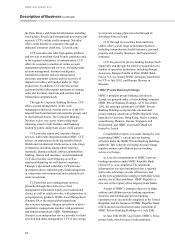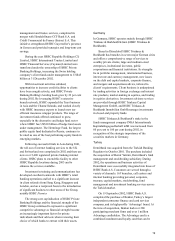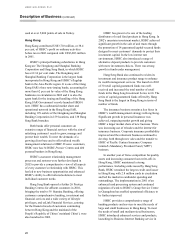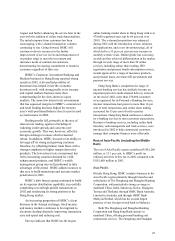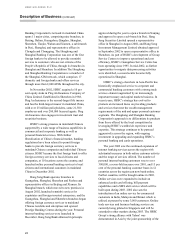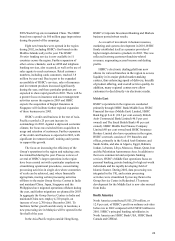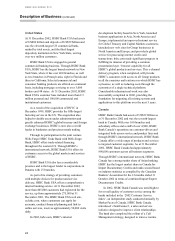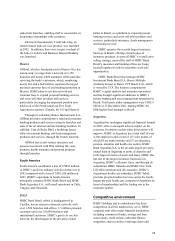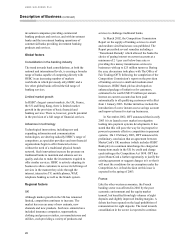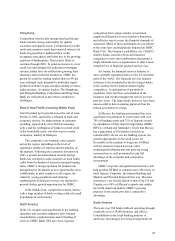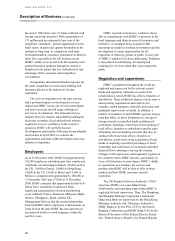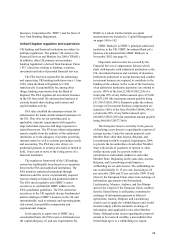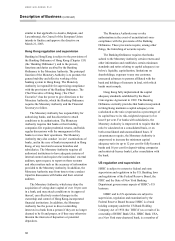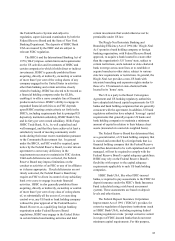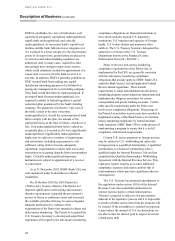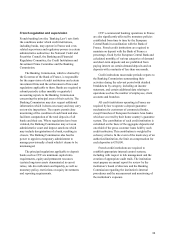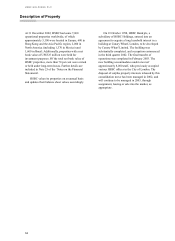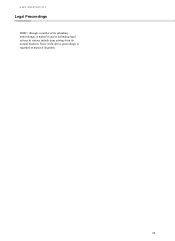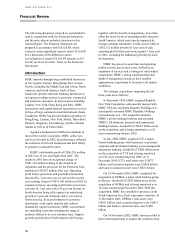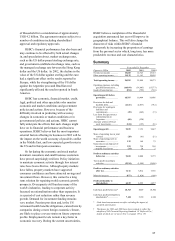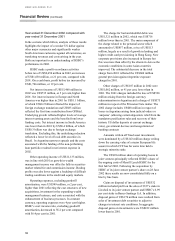HSBC 2002 Annual Report Download - page 30
Download and view the complete annual report
Please find page 30 of the 2002 HSBC annual report below. You can navigate through the pages in the report by either clicking on the pages listed below, or by using the keyword search tool below to find specific information within the annual report.
HSBC HOLDINGS PLC
Description of Business (continued)
28
the end of 2002 there were 53 banks in Brazil with
foreign ownership interests). With a population of
175 million and an estimated 63 per cent of the
population ‘unbanked’ , growth opportunities in the
retail sector, in particular, appear favourable in the
medium to long term. In comparison with more
developed markets, insurance penetration in Brazil is
fairly low, especially in the life business sector.
HSBC’s ability to cross-sell both life assurance and
general insurance products through its extensive
branch network means that it is well placed to take
advantage of this economic and competitive
environment.
In Argentina, international financial groups are
the main competitors as most major banking and
insurance players in the market are foreign
controlled.
The crisis in Argentina over the past year has
had a profound impact on the financial services
market and HSBC is now one of a few participants
still able to provide the full range of financial
services to its customers. The financial services
industry however remains unprofitable pending the
necessary economic, fiscal and political reforms
required to recover confidence in the country’s
prospects. HSBC will carefully monitor
developments, particularly following the presidential
election due in April 2003, to evaluate the
opportunities and risks within the financial services
industry in Argentina.
Employees
As at 31 December 2002, HSBC had approximately
192,000 employees (including part-time employees)
worldwide (of whom approximately 54,000 work in
the UK, 14,000 in France, 24,000 in Hong Kong,
14,000 in the US, 21,000 in Brazil and 15,000 in
Mexico), compared with approximately 180,000 at
31 December 2001 and 172,000 at 31 December
2000. HSBC estimates that approximately half of its
labour force worldwide is unionised. Most
significant concentrations of union membership
occur in Brazil, France, Indonesia, Malaysia, Malta,
Mexico, Philippines, Spain, and the UK.
Management believes that the current relationship
between HSBC and its employees is harmonious, as
it has been in the past. HSBC has not experienced
any material strikes or work stoppages within the
past five years.
HSBC is proud of its diverse workforce that is
able to communicate with HSBC’s customers in the
local languages and dialects across 80 countries and
territories. A continued focus on policies that
encourage an inclusive working environment and the
development of career opportunities for all,
regardless of ethnicity, gender or grade, is a key part
of HSBC’s employer of choice philosophy. Emphasis
is also placed on identifying, developing and
retaining the very best talent that exists around the
globe.
Regulation and supervision
HSBC’s operations throughout the world are
regulated and supervised by the relevant central
banks and regulatory authorities in each of the
jurisdictions in which HSBC has offices, branches or
subsidiaries. These authorities impose certain reserve
and reporting requirements and controls (for
example, capital adequacy, depositor protection, and
prudential supervision) on banks. In addition, a
number of countries in which HSBC operates impose
rules that affect, or place limitations on, foreign or
foreign-owned or controlled banks and financial
institutions, including: restrictions on the opening of
local offices, branches or subsidiaries and the types
of banking and non-banking activities that may be
conducted by those local offices, branches or
subsidiaries; restrictions on the acquisition of local
banks or requiring a specified percentage of local
ownership; and restrictions on investment and other
financial flows entering or leaving the country.
Changes in the supervisory and regulatory regimes of
the countries where HSBC operates, particularly in
Asia, will determine to some degree HSBC’s ability
to expand into new markets, the services and
products that HSBC will be able to offer in those
markets and how HSBC structures specific
operations.
The UK Financial Services Authority (‘FSA’ )
supervises HSBC on a consolidated basis.
Additionally, each operating bank within HSBC is
regulated by local supervisors. Thus, The Hongkong
and Shanghai Banking Corporation Limited and
Hang Seng Bank are supervised by the Hong Kong
Monetary Authority (the ‘Monetary Authority’ ),
HSBC Bank plc by the FSA, CCF by the French
Banking Commission and HSBC Bank USA by the
Board of Governors of the Federal Reserve Board
(the ‘Federal Reserve Board’ ), the Federal Deposit


